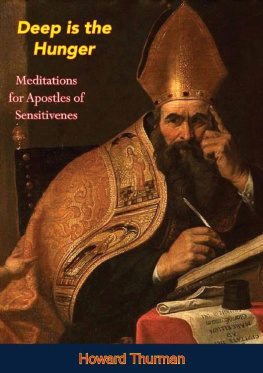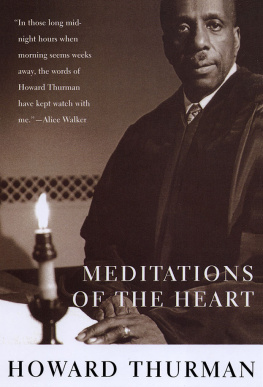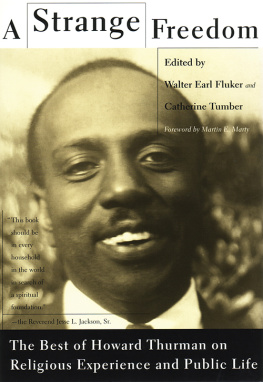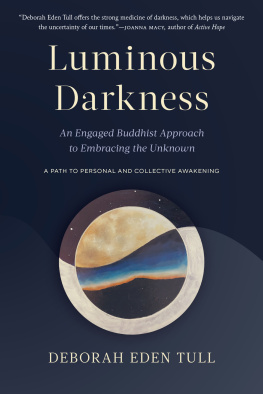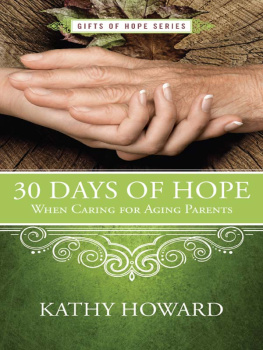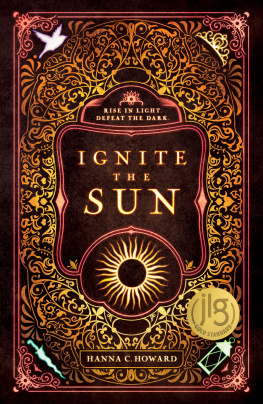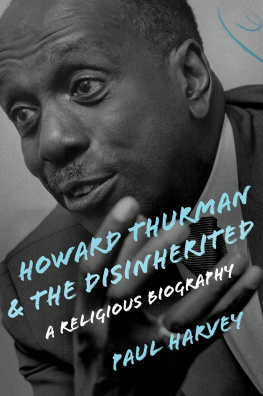Howard Thurman - The Luminous Darkness
Here you can read online Howard Thurman - The Luminous Darkness full text of the book (entire story) in english for free. Download pdf and epub, get meaning, cover and reviews about this ebook. year: 2014, publisher: Friends United Press, genre: Religion. Description of the work, (preface) as well as reviews are available. Best literature library LitArk.com created for fans of good reading and offers a wide selection of genres:
Romance novel
Science fiction
Adventure
Detective
Science
History
Home and family
Prose
Art
Politics
Computer
Non-fiction
Religion
Business
Children
Humor
Choose a favorite category and find really read worthwhile books. Enjoy immersion in the world of imagination, feel the emotions of the characters or learn something new for yourself, make an fascinating discovery.
- Book:The Luminous Darkness
- Author:
- Publisher:Friends United Press
- Genre:
- Year:2014
- Rating:5 / 5
- Favourites:Add to favourites
- Your mark:
- 100
- 1
- 2
- 3
- 4
- 5
The Luminous Darkness: summary, description and annotation
We offer to read an annotation, description, summary or preface (depends on what the author of the book "The Luminous Darkness" wrote himself). If you haven't found the necessary information about the book — write in the comments, we will try to find it.
The Luminous Darkness — read online for free the complete book (whole text) full work
Below is the text of the book, divided by pages. System saving the place of the last page read, allows you to conveniently read the book "The Luminous Darkness" online for free, without having to search again every time where you left off. Put a bookmark, and you can go to the page where you finished reading at any time.
Font size:
Interval:
Bookmark:


THE NEGRO SPIRITUAL SPEAKS OF LIFE AND DEATH
JESUS AND THE DISINHERITED
DEEP IS THE HUNGER
MEDITATIONS OF THE HEART
THE CREATIVE ENCOUNTER
DEEP RIVER
THE GROWING EDGE
FOOTPRINTS OF A DREAM
THE INWARD JOURNEY
TEMPTATIONS OF JESUS
DISCIPLINES OF THE SPIRIT
THE LUMINOUS DARKNESS

Library of Congress Cataloging-in-Publication Data
Thurman, Howard, 1900-1981.
The luminous darkness : a personal interpretation of the anatomy of segregation and the ground of hope / by Howard Thurman. 1st pbk. ed.
p. cm.
Reprint. Originally published: 1st ed. New York : Harper & Row, 1965.
ISBN 0-944350-07-0
ISBN 978-0-944350-92-8 (e book)
1. Afro-AmericansSegregation. 2. Race relationsReligious aspectsChristianity. 3. Thurman, Howard, 1900-1981. I. Title. E185.61.T47 1989
305.8960730924dcl9
[B] 89-30926
CIP
Copyright 1965 Howard Thurman. Published in 1965 by Harper and Row.
First paper edition by Friends United Press, 1989.
To
MOTHER BAILEY
who inspired generations of young Negroes to sense the luminous quality of darkness
PROLOGUE
In an appendix to a term paper, one of my students included the following in his description of his experience as a deep-sea diver:
"Enroute to the floor of the ocean the diver first passes through the 'belt of the fishes. This is a wide band of light reflected from the surface of the sea. From this area he moves to a depth of water that cannot be penetrated by light above the surface. It is dark, forboding, and eerie. The divers immediate reaction is apt to be one of fear and sometimes a sudden spasm of panic that soon passes. As he drops deeper and deeper into the abyss, slowly his eyes begin to pick up the luminous quality of the darkness; what was fear is relaxed and he moves into the lower region with confidence and peculiar vision.
If I say, Surely the darkness shall cover me
Even the night shall be light about me ...
The darkness and the light are both alike to Thee.
PSALM 139:11-12
HOWARD THURMAN
FOREWORD
This is an essay. It is, as the subtitle suggests, a personal interpretation of the anatomy of segregation and a testimony as to the grounds of hope for the individual. It is not a chronicle of the civil rights upheaval nor is it an interpretation of the social revolution of which the struggle for civil rights is a part. No effort has been made to assess the improvements that have taken place in the relation between the Negro American and the white American, nor to analyze the meaning of such developments. Quite deliberately I have refrained from discussing the organizations that have emerged to deal with the social crisis that is upon us and those that have been at work in the long weary years when there were no lights on the horizon and few voices to be heard in the land. Only incidental mention has been made of the heroes, the martyrs, and the leaders, some of whose names are household words wherever men tarry to talk seriously of the times in which we live and the goals of our strivings. The depth and extent of my support and involvement need not be reported here.
The fact that the first twenty-three years of my life were spent in Florida and in Georgia has left its scars deep in my spirit and has rendered me terribly sensitive to the churning abyss separating white from black. Living outside of the region, I am aware of the national span of racial prejudice and the virus of segregation that undermines the vitality of American life. Nevertheless, a strange necessity has been laid upon me to devote my life to the central concern that transcends the walls that divide and would achieve in literal fact what is experienced as literal truth: human life is one and all men are members one of another. And this insight is spiritual and it is the hard core of religious experience.
My roots are deep in the throbbing reality of the Negro idiom and from it I draw a full measure of inspiration and vitality. I know that a man must be at home somewhere before he can feel at home everywhere. Always the sense of separateness that is an essential part of individual consciousness must be overcome even as it sustains and supports. This is the crucial paradox in the achievement of an integrated personality as well as of an integrated society. To work as if the walls did not exist, to be nourished by the strength of ones ethnic idiom, and at the same time to be victimized by the walls is as exhilarating as it is hazardous. There is no waking moment or sleeping interval when one may expect respite from the desolation and despair of segregation.
There is no more fitting way to make an end of this Foreword than to quote a part of the final paragraph in my Ingersoll Lecture on The Negro Spiritual Speaks of Life and Death. "They [the slaves] made a worthless life, the life of chattel property, a mere thing, a body, worth living. They yielded with abiding enthusiasm to a view of life which included all the events of their experience without exhausting themselves in those experiences. To them this quality of life was insistent fact because of that which deep within them, they discovered of God, and His far-flung purposes. God was not through with them. And He was not, nor could He be exhausted by, any single experience or any series of experiences. To know Him was to live a life worthy of the loftiest meaning of life. Men in all ages and climes, slave or free, trained or untutored, who have sensed the same values, are their fellow-pilgrims who journey together with them in increasing self-realization in quest for the city that hath foundations, whose Builder and Maker is God.
Wherever it has seemed pertinent to use incidents or materials that have appeared in my earlier writing, I have done so.
THE LUMINOUS DARKNESS
ONE OF THE CENTRAL PROBLEMS IN HUMAN relations is applying the ethic of respect for personality in a way that is not governed by special categories. The question keeps intruding, "Does the category by which life is defined decree how the ethic shall be applied?" For instance, if a man is committed to a reverent view of life, does he rule out high regard for life that threatens or seems dangerous to him? If a particular man, by definition, is not human, then may not the ethical behavior that usually applies be suspended? Does a man tend to become immoral and irreligious as his security is threatened?
It is part of the wisdom of the Judaeo-Christian ethic that all men are enjoined to love God and to love one another. However ardently a man may hold to this attitude, his commitment is nevertheless threatened by the reality that he still will admit categories of exception and extenuating circumstances which amend and sometimes nullify his respect for human life.
During World War II I lived in California. It was not infrequent that one saw billboard caricatures of the Japanese: grotesque faces, huge buck teeth, large dark-rimmed thick-lensed eyeglasses. The point was, in effect, to read the Japanese out of the human race; they were construed as monsters and as such stood in immediate candidacy for destruction. They were so defined as to be placed in a category to which ordinary decent behavior did not apply. Without any apparent wrench of conscience or violation of due process, it was possible for the entire Japanese-American community to be removed from the West Coast and placed in relocation camps in the center of the country. It was open season for their potential extermination, thus providing immunity from guilt feelings. During World War I the same behavior was directed toward the Germans and people of German descent. Many churches and ministers joined in the practice. I have a friend who was so deeply injured by her experiences of this behavior during the war that she still cannot bring herself to attend Christian religious services of any kind. So conditioned was she that during World War II she lived in muted terror which expressed itself in the kind of alarm she showed whenever her doorbell rang in the early morning or in the late evening.
Font size:
Interval:
Bookmark:
Similar books «The Luminous Darkness»
Look at similar books to The Luminous Darkness. We have selected literature similar in name and meaning in the hope of providing readers with more options to find new, interesting, not yet read works.
Discussion, reviews of the book The Luminous Darkness and just readers' own opinions. Leave your comments, write what you think about the work, its meaning or the main characters. Specify what exactly you liked and what you didn't like, and why you think so.


